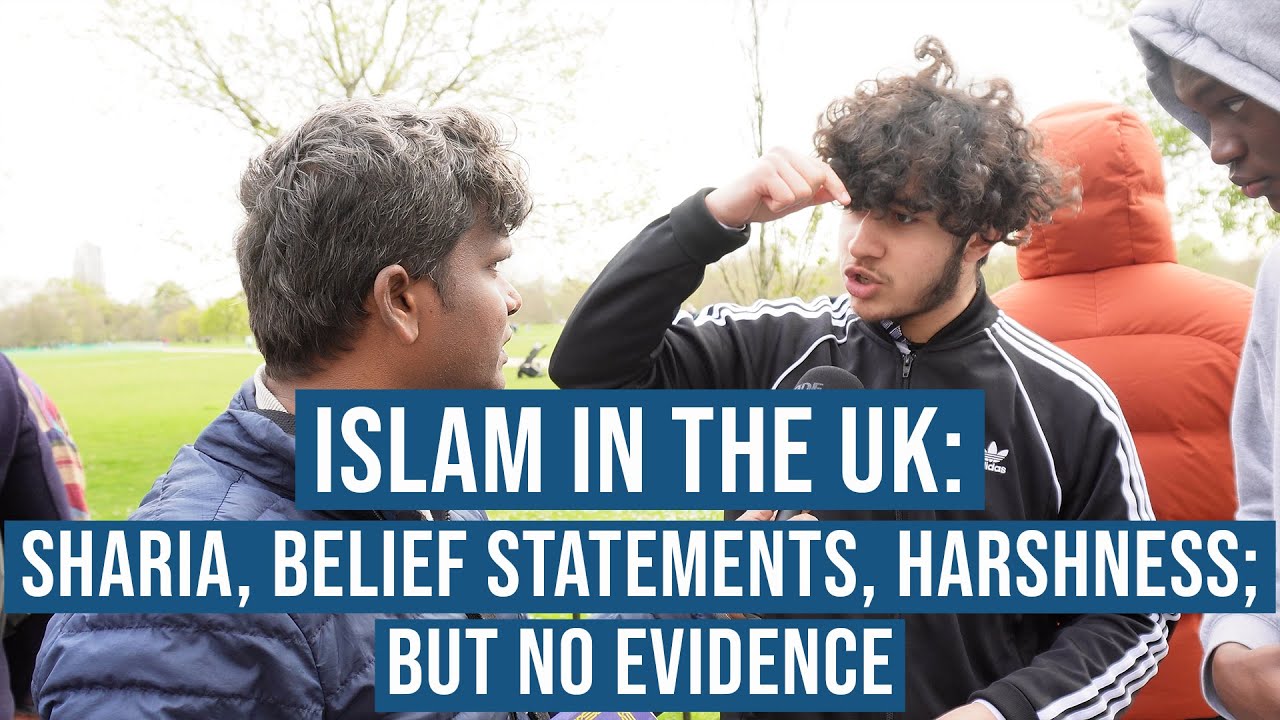[MUST WATCH] Arrogant Atheists Humiliate Themselves | Muhammed Ali | Speakers Corner
Summary
TLDRThe transcript captures a contentious discussion between two participants debating the concepts of literacy and communication, particularly in relation to the Prophet Muhammad's illiteracy and the authenticity of the Quran. One participant argues that an illiterate person cannot convey information effectively, while the other counters that the Quran was revealed to the Prophet over 23 years, despite his illiteracy. The conversation is marked by interruptions and a lack of mutual respect, highlighting the challenges of discussing deeply held beliefs. Ultimately, the exchange reflects broader themes of faith, understanding, and the nature of knowledge.
Takeaways
- 😀 The discussion highlights a debate about literacy, questioning the definition of an illiterate person and their ability to communicate.
- 😀 The speaker emphasizes that an illiterate person can still convey information verbally, despite their inability to read or write.
- 😀 There is a focus on the importance of listening and allowing each participant in the discussion to finish their thoughts without interruption.
- 😀 The conversation explores the concept of God in Islam, with one participant requesting a definition from Islamic scriptures.
- 😀 The dialogue raises questions about the credibility of delivering messages to an illiterate person, particularly in a religious context.
- 😀 The argument includes the assertion that the Quran was revealed to Prophet Muhammad over 23 years, responding to various circumstances.
- 😀 The participants discuss the process of how the Quran was compiled, involving companions of Muhammad who documented the revelations.
- 😀 There is tension regarding interruptions during the conversation, highlighting challenges in effective communication.
- 😀 The discussion touches on the historical context of Islamic teachings and the process of their transmission.
- 😀 The importance of respectful dialogue is underscored, with one participant indicating a refusal to engage further if the conversation remains disrespectful.
Q & A
What is the main argument regarding the concept of illiteracy in the discussion?
-The main argument revolves around whether an illiterate person can effectively convey or receive information. The participants debate the definition of illiteracy, asserting that it involves not being able to read or write, but questioning if a person can still speak or convey information in other ways.
How does one participant challenge the definition of an illiterate person?
-One participant argues that an illiterate person can still speak and convey information, suggesting that the ability to communicate verbally does not necessarily require literacy. They insist that illiteracy refers specifically to reading and writing skills.
What specific question is posed about the Prophet Muhammad's literacy?
-A participant questions how Prophet Muhammad could have conveyed the Quran if he was illiterate, asking who wrote down the revelations he received and how he could relay messages if he couldn't read or write.
What is the significance of the 23-year period mentioned in the discussion?
-The 23-year period refers to the time it took for the Quran to be revealed to Prophet Muhammad. Participants debate how the revelations were delivered and compiled over this time, questioning the process of its transmission.
How do the participants view the role of circumstantial events in the revelation of the Quran?
-Participants discuss how certain verses of the Quran were revealed in response to specific circumstances or questions posed to Prophet Muhammad, emphasizing the interactive nature of the revelations rather than a single continuous narrative.
What issues arise from the interruptions during the discussion?
-The interruptions highlight a breakdown in communication and respect among the participants. They illustrate the difficulty in reaching a constructive dialogue when one side frequently interrupts the other, which leads to frustration and confusion.
What was the response to the idea that the Quran was compiled after Prophet Muhammad's death?
-One participant mentions that the Quran was compiled two years after Prophet Muhammad's death under the first caliph, Abu Bakr, suggesting that the revelations were preserved and organized into the text known today.
How is the concept of respect discussed in relation to the conversation about religion?
-Respect is emphasized as a crucial component of any dialogue about religion. Participants express that disrespectful comments, especially towards Prophet Muhammad, undermine the possibility of a productive conversation.
What does the discussion reveal about the nature of debates regarding religious beliefs?
-The discussion underscores that debates about religious beliefs can quickly become heated and emotional, often veering into personal attacks or disrespect, rather than remaining focused on rational argumentation and understanding.
How do the participants define a 'literate person' in contrast to an 'illiterate person'?
-A literate person is defined as someone who can read and write, while an illiterate person is unable to perform these tasks. However, there is contention regarding the implications of these definitions on the ability to communicate effectively.
Outlines

このセクションは有料ユーザー限定です。 アクセスするには、アップグレードをお願いします。
今すぐアップグレードMindmap

このセクションは有料ユーザー限定です。 アクセスするには、アップグレードをお願いします。
今すぐアップグレードKeywords

このセクションは有料ユーザー限定です。 アクセスするには、アップグレードをお願いします。
今すぐアップグレードHighlights

このセクションは有料ユーザー限定です。 アクセスするには、アップグレードをお願いします。
今すぐアップグレードTranscripts

このセクションは有料ユーザー限定です。 アクセスするには、アップグレードをお願いします。
今すぐアップグレード関連動画をさらに表示

Muslims Begin with a Sharia Threat But End Up Clearing the Space When Challenged | Arul Velusamy

Christian Quotes A Hadith And Questions Muslims About Muhammad ﷺ | Hashim | Sh. Ibn Hazm

arrogant jew

The DISASTEROUS Imperfect Preservation Of The Quran [Debate] | Sam Shamoun

Overconfident Visitor's Ignorance About The Quran Is Exposed | Mansur | Speakers Corner

How Right IS Veritasium?! Don't Electrons Push Each Other??
5.0 / 5 (0 votes)
